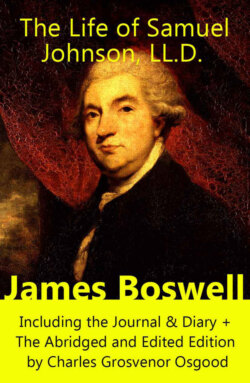Читать книгу The Life of Samuel Johnson, LL.D. - James Boswell - Страница 28
На сайте Литреса книга снята с продажи.
DEMETRIUS.
Оглавление‘A thousand horrid prodigies foretold it;
A feeble government, eluded laws,
A factious populace, luxurious nobles,
And all the maladies of sinking States.
When publick villainy, too strong for justice,
Shows his bold front, the harbinger of ruin,
Can brave Leontius call for airy wonders,
Which cheats interpret, and which fools regard?
When some neglected fabrick nods beneath
The weight of years, and totters to the tempest,
Must heaven despatch the messengers of light,
Or wake the dead, to warn us of its fall[317]?’
MAHOMET (to IRENE). ‘I have tried thee, and joy to find that thou deservest to be loved by Mahomet,—with a mind great as his own. Sure, thou art an errour of nature, and an exception to the rest of thy sex, and art immortal; for sentiments like thine were never to sink into nothing. I thought all the thoughts of the fair had been to select the graces of the day, dispose the colours of the flaunting (flowing) robe, tune the voice and roll the eye, place the gem, choose the dress, and add new roses to the fading cheek, but—sparkling.’
[Page 110: Johnson settles in London. A.D. 1737.]
Thus in the tragedy:
‘Illustrious maid, new wonders fix me thine;
Thy soul completes the triumphs of thy face:
I thought, forgive my fair, the noblest aim,
The strongest effort of a female soul
Was but to choose the graces of the day,
To tune the tongue, to teach the eyes to roll,
Dispose the colours of the flowing robe,
And add new roses to the faded cheek[318].’
I shall select one other passage, on account of the doctrine which it illustrates. IRENE observes,
‘That the Supreme Being will accept of virtue, whatever outward circumstances it may be accompanied with, and may be delighted with varieties of worship: but is answered, that variety cannot affect that Being, who, infinitely happy in his own perfections, wants no external gratifications; nor can infinite truth be delighted with falsehood; that though he may guide or pity those he leaves in darkness, he abandons those who shut their eyes against the beams of day.’
Johnson’s residence at Lichfield, on his return to it at this time, was only for three months; and as he had as yet seen but a small part of the wonders of the Metropolis, he had little to tell his townsmen. He related to me the following minute anecdote of this period: ‘In the last age, when my mother lived in London, there were two sets of people, those who gave the wall, and those who took it; the peaceable and the quarrelsome. When I returned to Lichfield, after having been in London, my mother asked me, whether I was one of those who gave the wall, or those who took it. Now it is fixed that every man keeps to the right; or, if one is taking the wall, another yields it; and it is never a dispute[319].’
